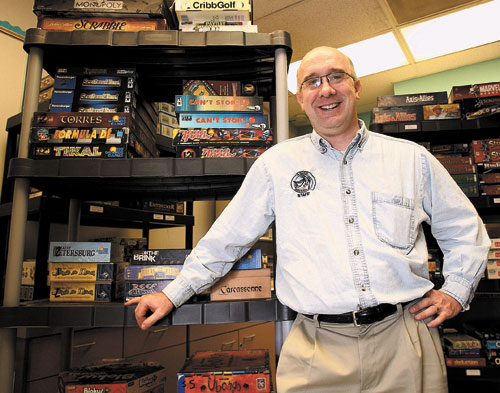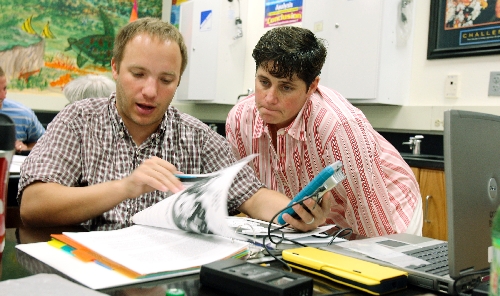Teachers master learning game
When Mike Patterson was growing up in Edmonton, Alberta, his family played board games for entertainment during the long Canadian winters.
His childhood pastime gave him an appreciation for mathematics. As a high school teacher of geometry, Patterson now uses board games to explain math to his students.
“I realized that math parallels a game,” Patterson said. “Math has a set of rules; so does a game. Math has a clear solution and goal, and so does a game. Then it’s a process of using those rules to gain an outcome. I’ve realized the reason why math comes easy to me is it that it parallels something I love to do.”
All the fun and games have paid off in a big way — $35,000 in prize money if the math is right. Patterson, 41, has been recognized with two prestigious awards, the Milken Educator Award, which comes with a $25,000 cash prize, and the Presidential Award for Excellence in Mathematics and Science Teaching, which includes a $10,000 prize and a trip to the White House.
“I’m going to meet the president,” said Patterson, who has dual citizenship and has taught in the Clark County School District for 11 years.
For the last seven years, he has taught at the Advanced Technologies Academy, a magnet high school at 2501 Vegas Drive, between Rancho Drive and Martin Luther King Boulevard.
A school district colleague, Cindy Kern, 38, also won the Presidential Award for Excellence in Mathematics and Science Teaching.
While the date for the award ceremony has not been announced, Patterson and Kern expect to be honored in Washington, D.C., before the end of the year.
Kern teaches honors biology and Principles of Science, a class for freshmen, at Green Valley High School, 460 N. Arroyo Grand Blvd., west of Stephanie Street in Henderson.
Patterson and Kern both said the key to successful teaching is an appreciation for the diversity of their students. Because everyone learns differently, what works for one student might not work for another.
“We lose students not because they can’t do it, but because we’re not speaking to their connection,” or style of learning, Patterson said.
Kern believes “every kid can learn science,” and she enjoys the challenge of figuring out how to best tailor the instruction to the individual.
“It’s such a fun thing,” Kern said. “You have 40 kids sitting in your class and every single one of them needs something different.”
Kern also believes that “kids intuitively love science.” Her goal is to make her students feel like active participants, not passive recipients of knowledge. She likes to engage students by comparing their beliefs to the scientific understanding of a subject.
As an example, “kids, nine times out of 10, don’t understand that light is energy,” Kern said. “They don’t understand waves. They don’t understand there is a spectrum. They don’t understand the part we see is a small part of the spectrum.”
If the instruction “is centered on them, they buy into it,” she said.
Kern, who is from Henderson and graduated from Basic High School, is working on a doctorate in science education from the University of Nevada, Las Vegas. She has taught at Green Valley for 13 years.
Her husband, Jason Kern, teaches English at the same school. They have an 8-year-old son, Khorbin.
Kern said she has been offered 25 opportunities in the last five years to leave the classroom for a promotion, but said she is having too much fun to give up teaching.
“I don’t want to be anywhere else but with kids,” she said.
Patterson loves the satisfaction of the “light bulb” effect, or seeing his students master a lesson.
Because curriculum needs to be presented in a variety of ways, he likes to engage students on a variety of levels. He might have them draw posters to engage their artistic sides. He might assign them to write papers on the lives of great mathematicians, many of whom suffered mental illness or were socially ostracized for being different.
It takes a “different kind of mind to unlock the mysteries and see the world in a different light,” Patterson said.
Fellow teachers have challenged him on the use of board games in the classroom, questioning how he even has time for them. Patterson has made videos for quick demonstrations. He simplifies the rules of a game to get to the core idea.
In the board game Mastermind, for instance, “students try to break a code with very strict logical reasoning. It’s a great way to teach proof and logic in a game format before they get to the formal geometry,” Patterson said.
He also has started a board game club for students. The club sponsors three “board game marathons” every academic year to raise money for the school district.
Advanced Technologies has a closet filled with stacks of board games like Risk and Axis & Allies.
He loves that kids want to play games in their spare time, because “they’re also developing those mathematical concepts and ideas.”
Patterson is not so crazy about video games, saying they can’t compare to board games.
“A board game for me is more than just the experience” of playing a game, Patterson said. “There’s communicating. There’s playing fair. There’s being a good sport if you lose. There’s a lot of things that board games teach that the new video games have lost.”
He and his wife, Nola, have three children, Tori, 15, Cameron, 13, and Jared, 10.
Patterson said he wants to use some of the prize money to take his wife on a European vacation.
Coincidentally, many of his favorite games come from Germany. He thinks Germans might have developed the games because they have long winters too.
Contact reporter James Haug at jhaug@reviewjournal.com or 702-374-7917.


















